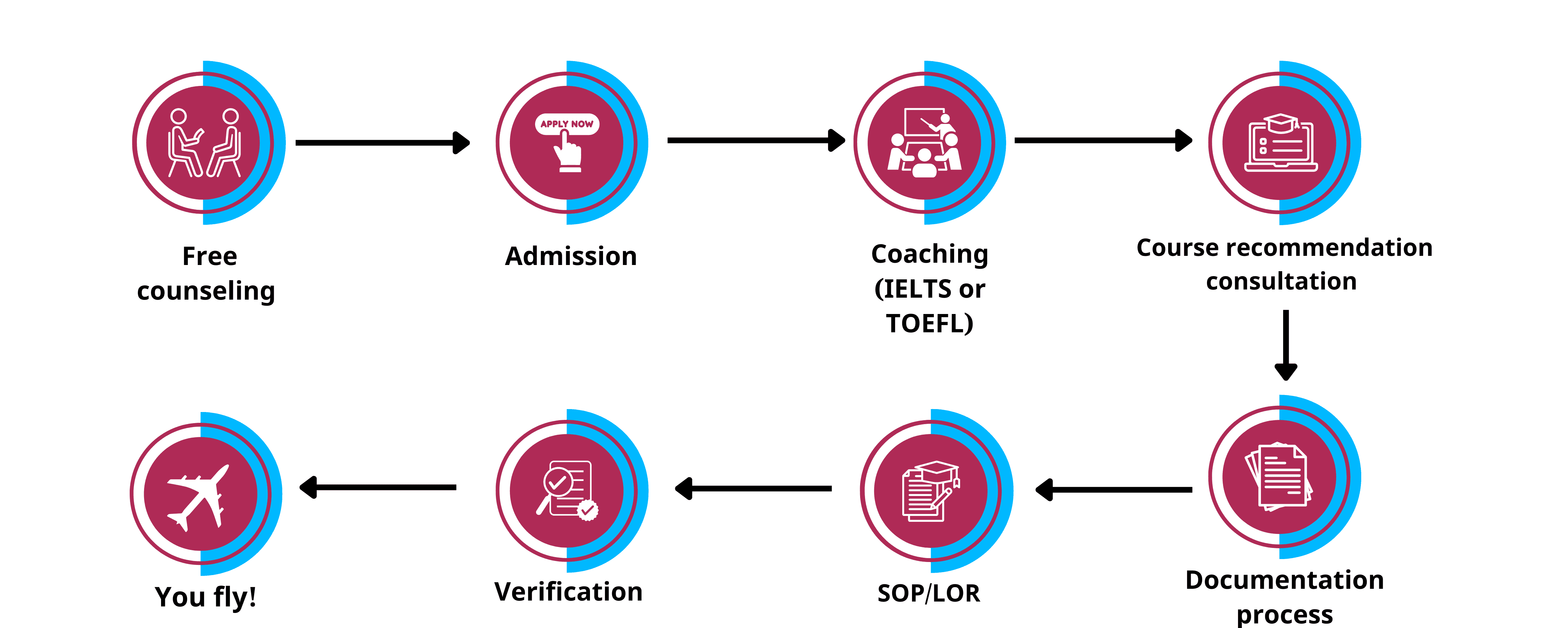
Study in Canada for Students - All you need to know!
Canada’s education system stands out globally for its research excellence and accessibility across diverse backgrounds. Offering flexible, student-centric programs, Canada's higher education is renowned for its adaptability. This attracts students worldwide, making it a top choice for master’s programs. With over 200 universities and colleges, Canada provides abundant options for bachelor's and higher degrees. Completing an undergraduate degree typically takes four years, followed by an additional two years for post-graduate studies in Canada.
Benefits of Studying in Canada
Canada has remained the top choice for international students for decades, and here's why
- Renowned for its excellent education quality and high academic standards, Canada is a favored study destination.
- A high standard of living attracts students to both study and settle in the country.
- Affordable tuition fees and living costs make Canada an attractive option for higher education.
- Generous scholarships support eligible students in need.
- Abundant job opportunities await skilled workers and graduates who complete their studies in Canada.
- Canada emphasises hands-on, experiential learning alongside classroom education, prioritising practical knowledge.
- Its diverse student community attracts learners from across the globe, fostering a rich cultural experience.
- After their education, students have the opportunity to apply for permanent residence in Canada
Student visa requirements for Canada
To be eligible for a Canadian student visa, you need to fulfill these criteria:
- Enroll in a designated university or have confirmed admission to a Canadian educational program that necessitates a Student visa.
- Demonstrate adequate funds to cover tuition fees, living expenses, and return transportation for yourself and accompanying family members.
- Maintain a clean criminal record and obtain a police certificate if mandated.
- Undergo health examinations as per requirements.
- Convince the visa officer of your intent to depart Canada upon completion of your education.
Intakes in Canada
Canada offers international students three intake periods:
- Fall intake: September to December
- Winter intake: January to April
- Summer intake: May to August
- Other: The fall intake remains the favored choice, with universities offering the majority of programs during this period. While less popular, the winter and summer intakes present opportunities for students preferring earlier or later study start times than the majority
Making this process easy for you

How to get a scholarship in Canada for Indian students?
Securing a strong IELTS score and impressive academic performance can significantly boost your chances of receiving scholarships to study in Canada. Several Canadian scholarship programs cater to Indian students, including:
- Ontario Graduate Scholarship
- Graduate Entrance Scholarship
- JN Tata Endowment Scholarship
- Aga Khan Foundation Scholarship
- Graduate Dean’s Entrance Scholarship
Our IELTS program
Welcome to iGuru Immigration's personalized IELTS training, featuring exclusive 1:1 sessions tailored to your needs. Our comprehensive program covers all exam components—listening, reading, writing, and speaking. With flexible scheduling, experienced instructors, and regular progress assessments, we ensure a focused and efficient preparation journey. Trust iGuru Immigration to guide you towards IELTS success in a supportive learning environment
Enroll NowOur Experience
What our Customers has to say!
FAQs
- The cost of studying in Canada varies based on several factors, including the chosen institution, program, location, and lifestyle. On average, tuition fees for international undergraduate students range from CAD 20,000 to CAD 40,000 per year, while for graduate programs, it can be between CAD 10,000 to CAD 30,000 per year. Additionally, living expenses such as accommodation, food, transportation, and other personal expenses can amount to around CAD 15,000 to CAD 20,000 per year, although this can vary widely based on location and lifestyle. These figures provide a general estimate, but costs can differ significantly between universities and regions in Canada. It's advisable to research specific institutions and programs for accurate and updated cost information. Additionally, scholarships, part-time work opportunities, and financial aid can help offset some expenses for eligible students.
- Receive Acceptance from a Designated Learning Institution (DLI): Get accepted into a Canadian educational institution authorized by the government to host international students.
- Gather Required Documents: Prepare the necessary documents, including a valid passport, letter of acceptance from the DLI, proof of funds to cover tuition and living expenses, a clean criminal record, and, if applicable, a medical exam certificate.
- Apply Online or via Paper Application: Submit your application for a Study Permit either online through the Immigration, Refugees, and Citizenship Canada (IRCC) website or through a visa application center (VAC) in your country. Pay the required fees and provide all supporting documents.
- Biometrics and Interview (if needed): Depending on your country of origin, you might need to provide biometrics (fingerprints and photo). In some cases, an interview might be requested.
- Wait for Processing: Allow time for the application to be processed. Processing times can vary, so it's advisable to apply well in advance.
- Receive Decision: Once your application is processed, you'll receive a decision. If approved, you'll get a Port of Entry (POE) Letter of Introduction or a Temporary Resident Visa (TRV) in your passport, depending on your country of origin.
- Arrival in Canada: With your Study Permit, you can travel to Canada. At the port of entry, present your documents to the immigration officer, including the POE Letter or TRV, to receive the Study Permit.
- Remember to maintain your status as a student in Canada by abiding by the conditions of your Study Permit, such as staying enrolled at a DLI and meeting academic requirements.
- A formal "Letter of Intent" isn't typically a required document for a Canadian Study Permit application. However, providing a clear and concise statement explaining your intentions to study in Canada and your educational goals can often strengthen your application.
- While not mandatory, a well-written letter can help immigration officials understand your motivations, the relevance of your chosen program to your academic or career aspirations, and your commitment to complying with Canadian visa regulations. This letter can be included as part of your application package to provide additional context and support to your study permit application.
Here is the approximate cost of tuition fees in Canada
Undergraduate Program – 12, 000 CAD
2Post-Graduate Program - 20,000 CAD to 30,000 CAD
- Yes, as an international student studying in Canada, you may be eligible to work while you study. The conditions and limitations regarding work depend on the type of program you are enrolled in and the status of your study permit. Here are some general guidelines:
-
- On-Campus Work: You can work on-campus at the institution where you study without a separate work permit. You can work up to 20 hours per week during regular academic sessions and full-time during scheduled breaks.
- Off-Campus Work: If you have a full-time student status and a valid study permit, you may be eligible to work off-campus. You can work up to 20 hours per week during regular academic sessions and full-time during scheduled breaks.
- Co-op Programs and Internships: Many Canadian universities offer co-op programs or internships as part of their curriculum. With a study permit, you can participate in these programs, which often involve paid work related to your field of study.
- Post-Graduation Work Permit: After completing your studies, you might be eligible for a Post-Graduation Work Permit (PGWP). This permit allows you to work in Canada for up to three years, depending on the duration of your study program.
- It's essential to verify the specific work permissions and conditions associated with your study permit to ensure compliance with Canadian immigration regulations.
- The application deadlines for programs in Canadian universities can vary widely depending on the institution, the level of study (undergraduate or graduate), and the specific program or field of study. However, here's a general overview:
-
- Undergraduate Programs: Deadlines for undergraduate programs often fall between early January and late March for the September (fall) intake. Some universities might have earlier deadlines for specific programs or for international students.
- Graduate Programs: Deadlines for graduate programs, including master's and doctoral programs, can vary significantly. Some might have application deadlines as early as the previous fall or winter for the following fall intake, while others might accept applications until early spring or later.
- Intake Periods: Canadian universities typically offer three main intake periods: Fall (September), Winter (January), and Summer (May). Fall intake deadlines are often the earliest and most commonly observed, while Winter and Summer intakes might have fewer program offerings and more flexible deadlines.
- Specific Programs and Scholarships: Some programs or scholarships might have specific deadlines that differ from general program deadlines. It's crucial to check the individual university's website or contact their admissions office for precise information regarding program deadlines and any scholarship opportunities.
- To ensure timely submission of your application, it's advisable to start researching and preparing your application materials well in advance of the deadlines, ideally several months beforehand. This allows ample time to gather required documents, prepare essays or statements of purpose, and fulfill any standardized testing or language proficiency requirements.
- Designated Learning Institutions (DLIs) are educational institutions in Canada that have been approved by the provincial or territorial government to host international students. These institutions meet specific criteria set by Immigration, Refugees and Citizenship Canada (IRCC) and are authorized to welcome foreign students under various study permit programs.
- The processing time for a study permit application for Canada can vary significantly based on various factors such as the applicant's country of residence, the volume of applications being processed, the time of year, and the specific visa office handling the application. As of my last update, here's a general estimate:
-
- Online Applications: In many cases, study permit applications submitted online might have shorter processing times. On average, it might take around 20-24 weeks (approximately 5-6 months) for online applications.
- Paper Applications: Paper applications typically take longer to process compared to online applications. They might take around 24-32 weeks (approximately 6-8 months) or longer.
- These are approximate processing times and can vary significantly. It's essential to check the current processing times on the official website of Immigration, Refugees and Citizenship Canada (IRCC) for the most up-to-date information.
- Additionally, applying well in advance of the intended start date of your program is advisable to account for potential delays in processing and to ensure you have sufficient time to complete all requirements and preparations for your studies in Canada.
- Yes, it is possible to change schools or programs while on a study permit in Canada, but there are specific steps and considerations to keep in mind:
-
- Update your Designated Learning Institution (DLI): If you plan to change institutions, ensure that your new school is a Designated Learning Institution (DLI) approved by Immigration, Refugees and Citizenship Canada (IRCC). You need to notify IRCC of the change in your DLI by updating your information online through your IRCC account.
- Adhere to Study Permit Conditions: Your study permit is linked to the institution or program you were approved for initially. Changing schools or programs may require you to apply for an updated study permit or an amendment to your existing permit to reflect the changes.
- Check Eligibility and Requirements: Before making any changes, verify the specific requirements and procedures with IRCC or a qualified immigration advisor. You might need a new letter of acceptance from the new institution or program and may be required to submit additional documents.
- Maintain Status: Ensure that you maintain status by adhering to the conditions of your study permit throughout the transition period. This includes staying enrolled full-time (unless otherwise authorized) and complying with any other conditions specified on your permit.
- Apply for Necessary Permits or Extensions: If the change requires a new study permit or an extension, apply for it well in advance to avoid any disruptions to your status.
- Always ensure you understand the implications and requirements of changing schools or programs while on a study permit in Canada, as failure to comply with the conditions or process could affect your immigration status. It's advisable to seek guidance from IRCC or an immigration professional before making any changes.
Eligibility Checklist
Canada
- Education - Level of education
- Language Skills - Language skills assessment
- Age - Younger applicants are more favored
- Work Experience - Full-time or part time work experience
Australia
- Education - Level of education
- Language Skills - Language skills assessment
- Age - Younger applicants are more favored
- Work Experience - Full-time or part time work experience
New Zealand
- Education - Level of education
- Language Skills - Language skills assessment
- Age - Younger applicants are more favored
- Work Experience - Full-time or part time work experience
Read Our Blogs

Exploring Case Studies: PTE's Role in Professional Certifications
July 26, 2024 | Harsh ShahThe Pearson Test of English (PTE) Academic has gained significant recognition worldwide, not only for immigration purposes but also for professional certifications. As the demand for standardized English proficiency tests grows, PTE has emerged as a preferred choice for many professionals seeking certifications in various fields. This article delves into case studies that highlight the use of PTE for professional certifications, providing insights into its effectiveness, reliability, and impact on career advancements. Relevant statistics and references are included to substantiate the discussion.
Read MoreHave More Questions?
Let’s Talk
Call Us At
+91 7066211000Mail Us On
admin@iguruimmigration.com


